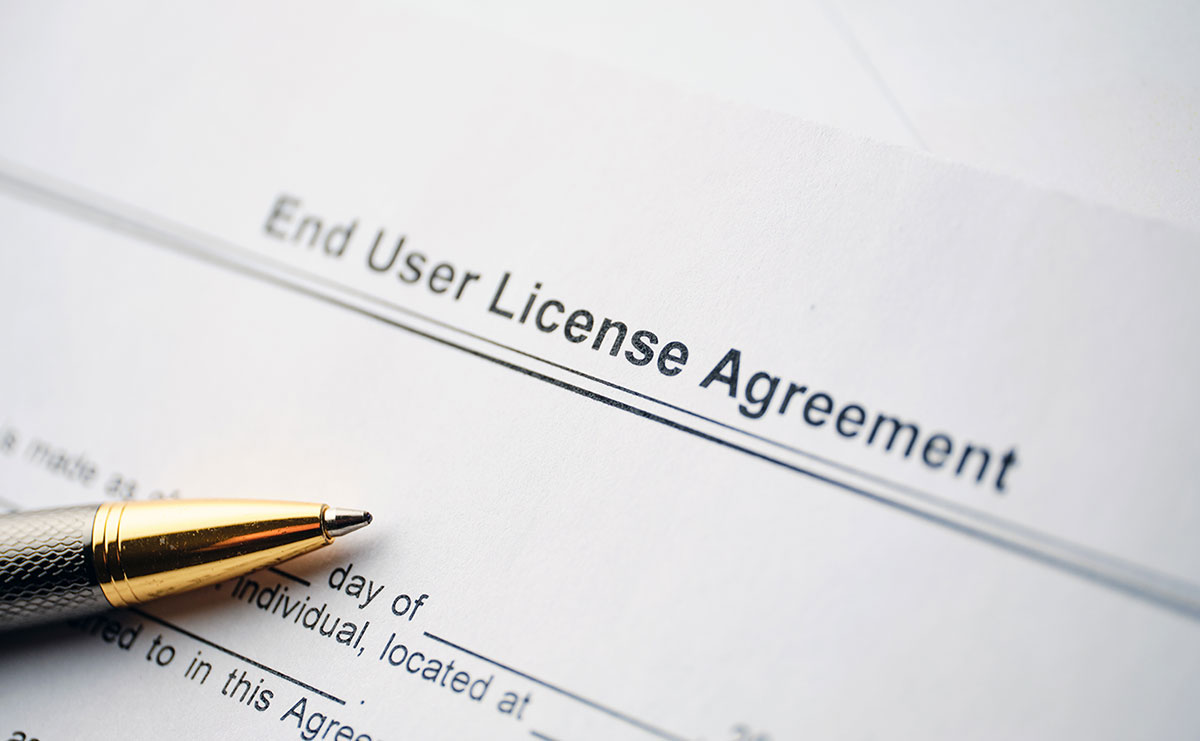Contents
What Is an End User License Agreement (EULA) and Why Is It Important?
An End User License Agreement (EULA) is a legally binding contract between a software provider and the user, outlining the terms and conditions for using the software. This agreement defines the user’s rights and restrictions, specifying how the software can be installed, accessed, and utilized. The EULA is crucial because it protects the intellectual property rights of the developer, ensuring that the software is used as intended and in compliance with legal standards. It sets clear expectations for usage, updates, maintenance, and support, limits the provider’s liability, and helps prevent unauthorized use and distribution. By providing users with a clear understanding of their rights and obligations, the EULA fosters a secure and legally compliant relationship between both parties, safeguarding the interests of both the software provider and the user.
What Is an End User License Agreement (EULA)?
“EULA” stands for End User License Agreement. It is a legal contract between the software developer or vendor and the user of that software. The EULA specifies the terms under which the software can be used, outlining the rights and restrictions of the end user. This agreement outlines the user’s rights and restrictions, including how the software can be installed, accessed, and utilized. The EULA protects the intellectual property rights of the developer, sets limitations on liability, and specifies conditions for updates, maintenance, and support. It also helps prevent unauthorized use, distribution, and modification of the software, ensuring a secure and legally compliant relationship between the software provider and the user.
The Importance of an End User License Agreement (EULA)
An End User License Agreement (EULA) is a crucial legal document in the realm of software usage and distribution. Here are the key reasons why an End User License Agreement is important:
- Legal Protection: An EULA provides legal protection for both the software provider and the user. It clearly defines the rights and obligations of each party, helping to prevent misunderstandings and disputes.
- Usage Terms: The EULA specifies how the software can be used, including any restrictions on usage. This helps ensure that the software is used in a manner that aligns with the provider’s intentions and legal requirements.
- Intellectual Property: By outlining the ownership and intellectual property rights of the software, the End User License Agreement (EULA) helps protect the provider’s creations and innovations from unauthorized use or distribution.
- Limitation of Liability: An EULA often includes clauses that limit the provider’s liability in case the software does not perform as expected or causes damage. This can protect the provider from costly lawsuits and claims.
- Updates and Maintenance: The EULA may include terms related to software updates, maintenance, and support, ensuring that users are aware of their rights and any obligations they may have regarding these services.
- Termination Conditions: The EULA specifies the conditions under which the agreement can be terminated, such as in cases of misuse or non-compliance. This helps protect the provider’s interests and ensures that users understand the consequences of violating the agreement.
- Security: By setting rules for software usage, the End User License Agreement (EULA) helps protect the software from unauthorized access and potential security breaches. This is important for maintaining the integrity and security of the software and its data.
- Compliance: For businesses, an End User License Agreement ensures that the use of software complies with industry regulations and standards. This is particularly important in sectors with strict regulatory requirements, such as healthcare or finance.
A EULA is a vital tool for protecting the rights and interests of both software providers and users. It ensures that software is used appropriately, legally, and securely, while also providing a clear framework for resolving any issues that may arise.
Standard End User License Agreement (EULA)
License Grant
The software provider (“Licensor”) grants you (“Licensee”) a non-exclusive, non-transferable, limited license to install and use the software (“Software”) on a single device for personal or internal business purposes in accordance with the terms of this End User License Agreement.
Restrictions on Use
Licensee shall not:
- Modify, adapt, translate, or create derivative works of the Software.
- Decompile, reverse engineer, disassemble, or otherwise attempt to derive the source code of the Software.
- Rent, lease, loan, resell, sublicense, distribute, or otherwise transfer the Software to any third party.
- Remove, alter, or obscure any proprietary notices, labels, or marks from the Software.
Ownership and Intellectual Property Rights
The Software is licensed, not sold. Licensor retains all rights, title, and interest in and to the Software, including all intellectual property rights therein. Licensee acknowledges that no ownership rights are transferred by this End User License Agreement.
Updates
Licensor may provide updates, upgrades, or enhancements to the Software at its sole discretion. Such updates may be subject to additional terms and conditions.
Term and Termination
This EULA is effective until terminated. Licensee may terminate this EULA at any time by uninstalling and destroying all copies of the Software. Licensor may terminate this End User License Agreement immediately if Licensee breaches any provision of this EULA. Upon termination, Licensee must uninstall and destroy all copies of the Software.
Limited Warranty
The Software is provided “AS IS” without warranty of any kind. Licensor disclaims all warranties, whether express, implied, or statutory, including, but not limited to, the implied warranties of merchantability, fitness for a particular purpose, and non-infringement. Licensor does not warrant that the Software will meet Licensee’s requirements or that the operation of the Software will be uninterrupted or error-free.
Limitation of Liability
To the maximum extent permitted by applicable law, in no event shall Licensor be liable for any indirect, incidental, consequential, special, or exemplary damages, including but not limited to, damages for loss of profits, goodwill, use, data, or other intangible losses, arising out of or in connection with the use or inability to use the Software, even if Licensor has been advised of the possibility of such damages.
Governing Law and Jurisdiction
This End User License Agreement (EULA) shall be governed by and construed in accordance with the laws of the jurisdiction in which Licensor is located, without regard to its conflict of law principles.
Data Collection and Privacy
The user data clause explains what data will be collected from users and how it will be used, while the privacy policies clause references the vendor’s privacy policy and compliance with data protection regulations.
- Export Restrictions
The export restrictions clause ensures that the software is used in compliance with export control laws and regulations, specifying the user’s responsibility to adhere to these laws.
- Entire Agreement
This End User License Agreement (EULA) constitutes the entire agreement between the parties concerning the subject matter hereof and supersedes all prior and contemporaneous agreements, proposals, or representations, written or oral, concerning such subject matter.
- Severability
If any provision of this EULA is held to be invalid or unenforceable, the remaining provisions shall continue in full force and effect.
13. Amendments
Details how the EULA can be modified, typically requiring written agreement by both parties.
- Contact Information
For any questions about this EULA or the Software, please contact Licensor at [Contact Information].
These clauses collectively ensure that the software vendor’s rights are protected while clearly outlining the user’s responsibilities and limitations in using the software.
Are End User License Agreement Legally Binding?
Yes, End User License Agreement (EULAs) are generally considered legally binding contracts, provided they meet certain legal requirements. Here are the key factors that contribute to the enforceability of an EULA:
1. Offer and Acceptance
The software provider offers the terms of the EULA to the user. The user accepts these terms, typically by clicking an “I agree” button (clickwrap agreement) or through continued use of the software (browsewrap agreement). The acceptance must be explicit and unambiguous.
2. Consideration
There must be an exchange of value between the parties. For example, the user receives the right to use the software in exchange for agreeing to the terms of the End User License Agreement (EULA).
3. Clear and Understandable Terms
The terms of the EULA must be clear and understandable. Ambiguous or unclear terms can be construed against the drafter (the software provider). The user must have a reasonable opportunity to review the terms before accepting them.
4. Legal Capacity
Both parties must have the legal capacity to enter into a contract. This means they must be of legal age and sound mind.
5. Lawful Purpose
The EULA must have a lawful purpose. Contracts involving illegal activities are not enforceable.
6. Meeting Legal Standards
The End User License Agreement (EULA) must comply with applicable contract laws and principles. It must not contain unconscionable or overly burdensome terms that could be deemed unfair under consumer protection laws.
7. Presentation and Consent
Users must be adequately notified of the EULA terms. Clickwrap agreements, where users actively click “I agree,” are more likely to be enforceable than browsewrap agreements, where terms are simply posted on a website. Users must provide informed consent, meaning they understand and agree to the terms knowingly.
8. Enforcement in Court
Courts generally uphold EULAs if the above criteria are met. However, specific clauses may be subject to judicial scrutiny, and unenforceable clauses (such as overly restrictive non-compete clauses or unreasonable liability limitations) may be struck down while leaving the rest of the EULA intact. Enforcement can vary based on jurisdiction and case precedent. Courts in different regions may interpret and enforce EULAs differently.
In summary, EULAs are legally binding contracts if they fulfill the necessary legal requirements, including clear offer and acceptance, consideration, legal capacity, lawful purpose, and compliance with contract and consumer protection laws. Users should read and understand the terms before agreeing to ensure they are aware of their rights and obligations under the EULA.

What Happens if I Violate an End User License Agreement (EULA)?
Violating an End User License Agreement (EULA) can lead to several significant consequences, including:
- Legal Action: The software provider may initiate legal proceedings against the violator, seeking damages, injunctions, or both. This can result in hefty fines and legal costs for the violator.
- Loss of Access: The violator may lose access to the software or service. The provider can revoke the license, rendering the software unusable.
- Financial Penalties: Apart from legal fines, the violator might be required to pay for any damages caused by the breach, which can include compensation for lost revenue or other financial losses incurred by the provider.
- Reputation Damage: Companies found in violation of an End User License Agreement (EULA) can suffer reputational harm, leading to a loss of customer trust and potential business opportunities.
- Security Risks: Unauthorized modifications or usage of software can introduce security vulnerabilities, putting both the violator and their clients at risk of data breaches and cyber-attacks.
- Operational Disruptions: Losing access to essential software can disrupt business operations, leading to productivity losses and operational inefficiencies.
- Criminal Charges: In severe cases, End User License Agreement violations that involve piracy or unauthorized distribution can result in criminal charges, potentially leading to imprisonment.
Understanding and adhering to the terms of an EULA is crucial to avoid these consequences and maintain a lawful and secure business operation.
Legal Principles and Considerations Relevant to EULA
The legal framework governing EULAs is complex, involving various aspects of contract law, intellectual property law, consumer protection, and privacy law. Below is an overview of the legal principles and considerations relevant to EULAs.
-
Contract Law
Formation and Enforceability
- Offer and Acceptance: An EULA is typically presented to the user as a “clickwrap” agreement, where the user must click “I agree” to accept the terms before installing or using the software. This process ensures that the End User License Agreement (EULA) is a legally binding contract.
- Consideration: The exchange of value, where the user gains access to the software in return for agreeing to the terms, satisfies the requirement of consideration in contract law.
Key Contractual Elements
- Clear Terms: For an End User License Agreement (EULA) to be enforceable, its terms must be clear and unambiguous. Any ambiguous terms are generally construed against the drafter (the software provider).
- Mutual Assent: Both parties must mutually agree to the terms. Users indicate their assent by accepting the agreement before using the software.
Breach of Contract
- Remedies for Breach: If a user violates the End User License Agreement, the software provider may seek remedies such as termination of the license, damages, or injunctive relief to prevent further unauthorized use.
-
Intellectual Property Law
Protection of Software
- Copyright: EULAs are crucial for protecting the software’s copyright, ensuring that the developer retains exclusive rights to reproduce, distribute, and create derivative works.
- Patents and Trademarks: In some cases, software may also be protected by patents or trademarks. The EULA (End User License Agreement) will outline the scope of these protections and any relevant restrictions on use.
Restrictions on Use
- Prohibited Actions: EULAs often include provisions that prohibit reverse engineering, decompiling, or otherwise tampering with the software’s code to protect the developer’s intellectual property.
-
Consumer Protection Law
Fair Terms and Practices
- Unconscionability: A End User License Agreement must not contain unfair or overly burdensome terms. Courts may refuse to enforce provisions deemed unconscionable or against public policy.
- Transparency: Terms must be clearly communicated to the user, and the user must have a reasonable opportunity to review them before acceptance.
Disclosures
- Material Information: Developers must disclose important information about the software, including any limitations, known issues, or risks associated with its use.
-
Privacy Law
Data Collection and Use
- User Consent: If the software collects personal data, the End User License Agreement (EULA) must include a privacy policy that informs users about the type of data collected, how it will be used, and any third parties with whom the data will be shared.
- Compliance with Regulations: EULAs must comply with relevant data protection laws, such as the General Data Protection Regulation (GDPR) in Europe or the California Consumer Privacy Act (CCPA) in the United States.
Security Obligations
- Data Protection: The EULA may outline the software provider’s obligations to protect user data and implement security measures to prevent unauthorized access or breaches.
-
Jurisdiction and Dispute Resolution
Governing Law
- Choice of Law: The EULA typically specifies which jurisdiction’s laws will govern the agreement. This helps ensure predictability and consistency in how the terms are interpreted and enforced.
Dispute Resolution Mechanisms
- Arbitration and Mediation: Many EULAs include clauses requiring disputes to be resolved through arbitration or mediation rather than through the court system, which can be faster and less costly.
- Venue and Jurisdiction: The EULA may designate a specific court or location where disputes will be heard, providing clarity on where legal proceedings will take place.
Overall, EULAs play a critical role in the legal landscape of software usage, balancing the rights and responsibilities of developers and users. By understanding the legal principles underpinning EULAs, both parties can better navigate their rights and obligations, ensuring a fair and legally compliant software experience.
What Does an End User License Agreement Mean for Software Vendors?
For software vendors, an End User License Agreement (EULA) is a crucial legal document that outlines the terms under which end users can use their software. Here’s what a EULA means for software vendors:
Legal Protection
- Intellectual Property Rights: A EULA helps protect the vendor’s intellectual property by defining the software as proprietary and outlining what constitutes permissible use. This reduces the risk of unauthorized copying, sharing, or modification.
- Limitation of Liability: It limits the vendor’s liability by including disclaimers that protect against potential lawsuits. This can cover issues such as software defects, data loss, or security breaches, ensuring that the vendor is not held responsible for unintended consequences arising from the use of the software.
Revenue Security
- Prevention of Piracy: The End User License Agreement includes clauses that restrict the copying and redistribution of the software, helping to prevent piracy and ensuring that only paying customers can legally use the product.
- License Fees and Renewals: The agreement can specify the terms of payment for the software license, including one-time fees, subscriptions, or renewal terms, providing a clear structure for revenue generation.
Control Over Software Use
- Usage Restrictions: It defines how the software can be used, such as restricting the number of devices on which it can be installed or prohibiting reverse engineering. This ensures that the software is used in a manner that aligns with the vendor’s business model and intellectual property strategy.
- Modification Prohibitions: By prohibiting the modification of the software, the End User License Agreement (EULA) ensures that the vendor’s original code remains intact, which helps maintain the software’s integrity and performance.
Regulatory Compliance
- Legal Compliance: It ensures that the software is used in compliance with applicable laws and regulations, such as data protection laws, export controls, and industry-specific regulations. This helps avoid legal issues and penalties for both the vendor and the end user.
- Jurisdiction and Dispute Resolution: The EULA can specify the legal jurisdiction and methods for resolving disputes (e.g., arbitration or mediation), which provides a predictable legal framework for handling conflicts.
Customer Relationship Management
- Support and Maintenance Terms: It outlines the terms of support and maintenance services, setting clear expectations for end users about what is included and what is not. This helps manage customer expectations and reduces the potential for disputes over support obligations.
- Update and Upgrade Policies: The End User License Agreement (EULA) can detail the vendor’s policies regarding software updates and upgrades, ensuring that users understand the conditions under which they will receive new features or security patches.
Risk Management
- Termination Clauses: It includes conditions under which the license can be terminated, such as a breach of the agreement. This allows the vendor to revoke access to the software if the user fails to comply with the terms.
- Data Protection and Privacy: The End User License Agreement (EULA) can include clauses related to data protection and privacy, outlining how user data will be handled and ensuring compliance with relevant privacy laws.
Strategic Advantages
- Competitive Differentiation: A well-crafted End User License Agreement can differentiate the vendor from competitors by clearly articulating the benefits and terms of the software, enhancing the vendor’s reputation for transparency and professionalism.
- Market Expansion: By providing a clear legal framework, the EULA can facilitate the expansion of the vendor’s market by ensuring that the software is used correctly and legally across different regions and jurisdictions.
In summary, an EULA is essential for software vendors as it provides comprehensive legal protection, secures revenue, ensures regulatory compliance, and helps manage customer relationships effectively.
Conclusion
An End User License Agreement (EULA) is an essential legal document for software vendors and users alike. It outlines the terms and conditions under which the software can be used, offering significant benefits to both parties. For vendors, an EULA provides critical legal protection, securing intellectual property rights, limiting liability, and ensuring compliance with various laws and regulations. It also helps in preventing piracy, defining usage restrictions, and setting clear terms for support, updates, and termination. For users, a End User License Agreement (EULA) offers transparency, detailing their rights and responsibilities, including how their data will be handled and what support they can expect. By clearly delineating the scope of use and the consequences of non-compliance, an EULA helps maintain a secure, lawful, and mutually beneficial relationship between software providers and users. Overall, the EULA is a vital tool that safeguards the interests of software vendors while providing users with a clear understanding of their obligations and protections.
Disclaimer: The content provided on this blog is for informational purposes only and does not constitute legal, financial, or professional advice.







